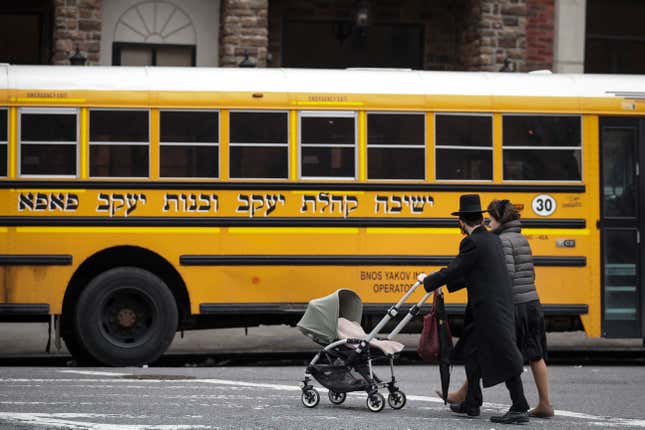Responding to a Measles Outbreak, NYC Mayor Orders Mandatory Vaccinations in Some Neighborhoods
Latest

On Tuesday morning, responding to a growing and serious measles outbreak in largely Haredi Jewish areas of Brooklyn, New York City mayor Bill de Blasio declared a public health emergency. He also ordered all unvaccinated individuals in those neighborhoods to receive a measles vaccine, saying in a press conference, “This is the epicenter of a measles outbreak that is very, very troubling and must be dealt with immediately.” In the midst of an ongoing series of measles outbreaks across the U.S. and a renewed wave of anti-vaccination misinformation, the response to the order is probably going to be very, very loud.
As of April, there have been 285 confirmed cases of measles in Brooklyn and Queens, most of them, the city says, involving people in the Orthodox community. A huge concentration of those cases are in Williamsburg, and the mandatory vaccination order covers the four zip-codes in that area. (The order is not just confined to Orthodox Jews.) Earlier this month, responding to a similar measles outbreak in Orthodox communities in Rockland County, New York, the county commissioner there issued an emergency order barring unvaccinated children from schools and other public areas for 30 days; that order was halted on Friday by a temporary court ruling.
The New York City health commissioner, Dr. Oxiris Barbot, told Stat News the outbreaks are being fueled by “a small group of anti-vaxxers in these neighborhoods. They have been spreading dangerous misinformation based on fake science.”
Requiring vaccines in an emergency situation is a highly unusual but not unheard-of step, says Dorit Reiss, a professor at UC Hastings and an expert on vaccines, law and policy. In an interview with Jezebel, she said that while it’s well within their legal rights as a city, New York City’s order is one of the broadest she’s seen in years.
“This is a very, very broad measure,” Reiss said, “and it might be seen as going too far.”
-

-

-

-

-

-

-

-

-

-

-

-

-

-

-

-

-

-

-

-

-

-

-

-

-

-

-

-

-

-

-

-

-

-

-

-

-

-

-

-








































